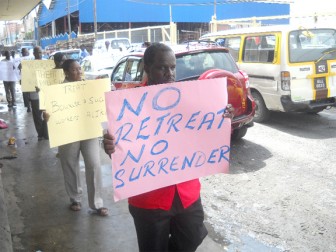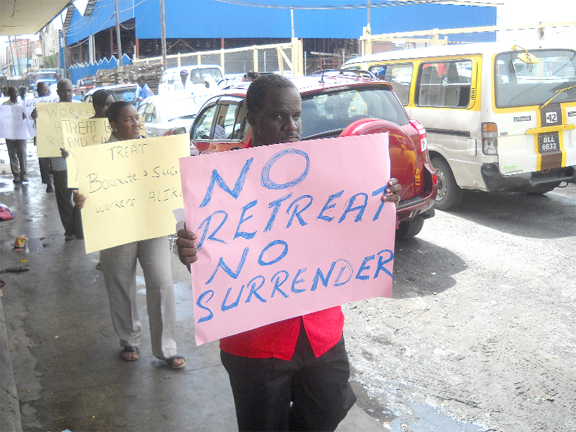The application by some employees of RUSAL subsidiary, BCGI to have the Guyana Bauxite and General Workers Union (GB&GWU) derecognised as the bargaining unit for workers has been denied by the Trade Union Recognition and Certification Board (TUR&CB).
The decision of the board was formally communicated to the workers on February 18, 2011, more than a year after the matter was first brought to the TUR&CB. Stabroek News managed to obtain a copy of the letter, signed by the board’s secretary Charles Ogle and addressed to Linden Prince. Stabroek News understands that Prince is the representative of the workers’ committee established at the Bauxite Company of Guyana Inc. (BCGI).
The text of the letter read:
“The Trade Union Recog-nition and Certification Board received your petition of names and signatures of workers who are no longer desirous to be members of the GB&GWU.
You are aware that a verification procedure (survey) was conducted by two officers of the Ministry of Labour, and a report was prepared and submitted to the Board.
In the circumstance, your request had not met the requirements of the Law, hence the union remains the recognized union of the company.”
Contacted last evening, Labour Minister Manzoor Nadir said that he had been informed that the Board met on the third Tuesday of last month and determined that the workers who had asked for the union to be derecognised did not represent 40 percent of the bargaining unit, as legally required. He said that the ministry has always maintained that the GB&GWU was the recognised bargaining unit for the workers.
 Nadir said that while the company said that there was no Collective Labour Agreement (CLA) with the union in place, he said that the ministry did not agree with this position by the BCGI. “As far as we are concerned, there is a CLA and a recognised union,” he said. The company, Nadir added, was informed that the TUR&CB was the only entity that could derecognise the union. The union has accused BCGI of coercing workers into applying for derecognition.
Nadir said that while the company said that there was no Collective Labour Agreement (CLA) with the union in place, he said that the ministry did not agree with this position by the BCGI. “As far as we are concerned, there is a CLA and a recognised union,” he said. The company, Nadir added, was informed that the TUR&CB was the only entity that could derecognise the union. The union has accused BCGI of coercing workers into applying for derecognition.
Questioned as to what is the next step to resolve the outstanding issues, Nadir said that the ministry wants the parties to meet and settle their own differences. “Our preference is for the parties to meet at the table and iron out their differences,” he explained. Nadir said that the meetings between him and the parties had been put on hold since he had been informed that the general manager of the company was on leave. According to him, the general manager is expected in the country soon and the meetings should resume shortly. He said that all the available options will be considered. “Everything that was put on the table is on the table on both sides,” Nadir said.
Representatives of the BCGI have remained tight-lipped on this issue ever since it became public.
Meanwhile, the GB&GWU, in a release, yesterday once again criticised Nadir for his “refusal to put measures in place to bring the BCGI to the table to honour its obligation.” It said, “This impasse, which began since May 2009 has escalated to seeing 62 workers dismissed without due recourse, tens of millions of dollars denied in income, the right to work taken away, workers suspended for protesting unsafe conditions, industrial accident and death, the failure to allow for the negotiations for improved working conditions and increased wages/salaries for two consecutive years.”
The minister, the release charged, has failed to use his power to order compulsory arbitration in the ongoing dispute, despite requests for this to be done.
The GB&GWU, according to the release, yesterday sent letters to the PPP General Secretary Donald Ramotar and GAWU President Komal Chand highlighting the issue and seeking their solidarity in having the minister “uphold the law for bauxite workers.”
Meanwhile, General Secretary of the GB&GWU Lincoln Lewis yesterday said that while the company and the union representatives have met in the same room “there has been no exchange between the two parties.” He said that the representatives of the company, in the presence of Nadir, stated bluntly that they were not dealing with the union but with the ministry. “That’s in breach of the law,” Lewis said.
Lewis repeated his call for arbitration to be introduced. “There must be mechanisms for arbitration to address all the outstanding issues,” he said. He noted that in the past, the Labour Ministry has not been afraid to implement compulsory arbitration in disputes involving GAWU and GuySuCo. He pointed to 2009, when Nadir had intervened to order compulsory arbitration even as the two parties were still talking. “In this case the parties are not engaging… and it has been 16 months,” Lewis said.
On November 22, 2009, over 300 workers came together and staged strikes at the Kwakwani and Aroaima sites after the GB&GWU and the BCGI failed to reach a satisfactory agreement on wages.
The BCGI later began to distribute suspension letters to some of the employees, saying that they abandoned their workplace without reason. A few days later, the majority of the workers returned to work while 57 were dismissed. Representatives of the company have argued that during the wages negotiations with the company, the GB&GWU had agreed to one of three options presented and then reneged. This option was for a 10% retroactive pay hike and the retrenchment of 75 workers. Although, the union has denied this, documents have, however, shown that union had agreed to the option.
However, it has been argued that even if the union had agreed to workers being fired, this would have to follow a certain protocol, which would entail the last come, first go method; the most recent employees would be the first to be dismissed. The union has argued that the dismissal of the workers was done in a discriminatory manner.








